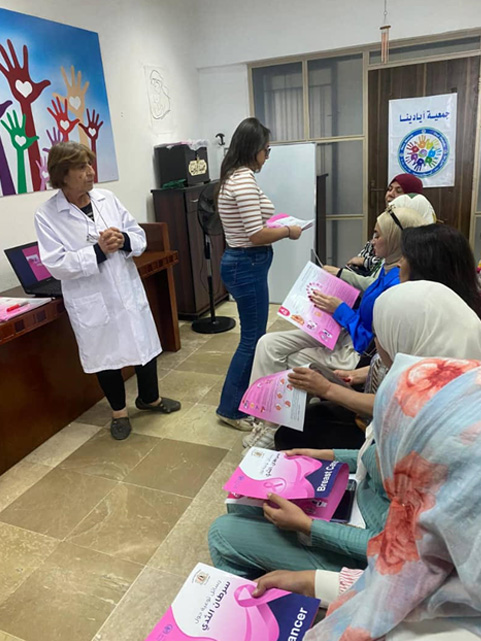 Maha Younes actively engages in raising awareness by distributing educational flyers on breast cancer16 February 2025 –Amid Syria’s enduring crisis, waterborne diseases have remained a major concern, especially for the most vulnerable communities. In response, WHO, in partnership with the Ministry of Health, conducted risk communication and community engagement (RCCE) workshops in Deir-ez-Zor and Lattakia governorates in late 2024, with a focus on raising awareness and providing lifesaving support.
Maha Younes actively engages in raising awareness by distributing educational flyers on breast cancer16 February 2025 –Amid Syria’s enduring crisis, waterborne diseases have remained a major concern, especially for the most vulnerable communities. In response, WHO, in partnership with the Ministry of Health, conducted risk communication and community engagement (RCCE) workshops in Deir-ez-Zor and Lattakia governorates in late 2024, with a focus on raising awareness and providing lifesaving support.
The Central Emergency Response Fund (CERF) allows the United Nations and its agencies to act quickly when humanitarian needs arise, enabling humanitarian responders to deliver lifesaving assistance whenever and wherever crises strike.
Thanks to funding from CERF, WHO trained 200 community health workers from NGOs and health directorates. These dedicated frontline workers gained essential skills to connect with at risk populations and deliver critical education on preventing waterborne diseases such as cholera.
Maha Younes, a 27-year-old health educator with Ayadina Association in Lattakia, was one of the trainees.
“The training was invaluable,” she said. “It gave me the tools and confidence to speak out about waterborne diseases in my community. Now I can clearly explain the importance of safe water and hygiene practices to the families who need it most.”
At Ayadina Association, Maha and her colleagues have turned waiting times at health facilities into valuable moments for education, focusing especially on women and children.
“Prevention is always our first line of defence,” she explained. “Thanks to WHO’s training, I now have the knowledge, confidence and capacity to share accurate health information, empowering people to protect themselves, their families and loved ones."
WHO supported interactive sessions provided community health workers with the ability to lead change in their communities, communicating crucial prevention strategies such as proper sanitation, safe water use and effective hygiene measures. These efforts not only strengthen community resilience but bolster the health care system’s capacity to respond to disease outbreaks.
Maha’s contribution to her community was made possible by resources that were part of a larger CERF-funded multisectoral emergency response project to support critical health interventions across Syria. The project focuses on reducing morbidity and mortality by restoring access to health care, strengthening emergency referral systems and addressing severe malnutrition.
Through these initiatives, WHO is creating long-term change by building local expertise to ensure vulnerable populations have access to lifesaving interventions. As Syria continues to manage multiple challenges these crucial efforts help safeguard public health and prevent future outbreaks.


